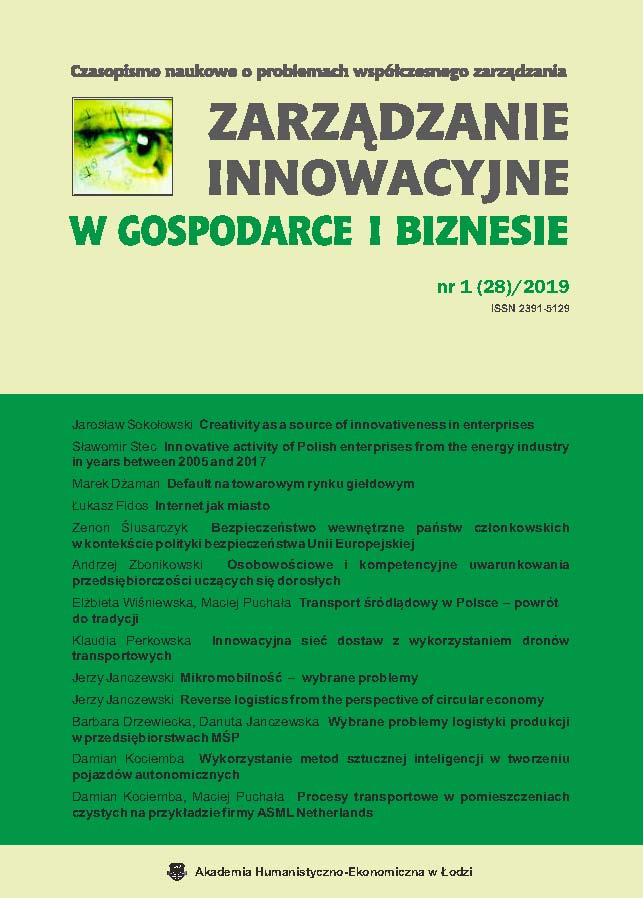Kreatywność jako źródło innowacyjności w przedsiębiorstwie
DOI:
https://doi.org/10.25312/2391-5129.28/2019_01jsSłowa kluczowe:
kreatywność, innowacje, kapitał ludzkiAbstrakt
We współczesnych warunkach gospodarowania wiedza i kreatywność stanowią zasadnicze czynniki konkurencyjności przedsiębiorstw. Konkurencyjność ta oparta jest na działalności innowacyjnej, dającej przedsiębiorstwu przynajmniej na jakiś czas przewagę na rynku i możliwość realizacji zysków wyższych od przeciętnych w danej branży. Jednym z podstawowych źródeł innowacji w przedsiębiorstwach jest kreatywność osób i zespołów zaangażowanych w ich działalność. Kreatywność, której ucieleśnieniem są twórcze pomysły, a następnie projekty innowacyjne, jest przejawem istnienia w przedsiębiorstwie kapitału ludzkiego zdolnego do tworzenia nowych wartości intelektualnych i rynkowych, tworzących wartość dla wszystkich grup interesariuszy zaangażowanych w działalność przedsiębiorstwa. Celem niniejszego artykułu jest doprecyzowanie pokrewnych pojęć, takich jak kreatywność, twórczość, innowacyjność (stosowanych niekiedy jako synonimy) oraz wykazanie związku występującego pomiędzy nimi. Szczególną uwagę poświęcono kreatywności, jej źródłom, przejawom i jej wpływie na innowacyjność.
Pobrania
Bibliografia
Andrzejewska B. (2005), Twórczość jako cel i metoda kształcenia, [in:] K.J. Szmidt (ed.), Trening twórczości w szkole wyższej, Wydawnictwo WSHE w Łodzi, Łódź.
Bal-Woźniak T. (2013), O potrzebie wykorzystywania nowych form koordynacji współpracy w zarządzaniu innowacyjnością, „Nierówności Społeczne a Wzrost Gospodarczy”, nr 30.
Francik A. (2009), Innowacje jako źródło przedsiębiorczości, [in:] J. Targalski, A. Francik (eds.), Przedsiębiorczość i zarządzanie firmą, C.H. Beck, Warszawa.
Józefowski E. (2017), Wybrane aspekty profesjonalizacji i komercjalizacji kreatywności, [in:] E. Woźnicka, K. Witerska, L. Kuras (eds.), Konceptualizacja profesjonalizacji kreatywności, Wydawnictwo AHE w Łodzi.
Nawrat D. (2013), Kształtowanie kompetencji innowacyjnych w świetle badań biografii menedżerów, „Przedsiębiorczość i Zarządzanie”, Vol. 14, No. 4.
Nęcka E. (2001), Psychologia twórczości, GWP, Gdańsk.
Okraj Z. (2013), Twórczy nauczyciel wczesnej edukacji – cechy i zachowania, [in:] Kompetentny nauczyciel wczesnej edukacji, Wydawnictwo UJK w Kielcach, Kielce.
Poskrobko B. (2015), Kreatywność pracowników jako narzędzie kształtowania zrównoważonego rozwoju przedsiębiorstwa, „Academic Works of EU in Wrocław, No. 376. DOI: https://doi.org/10.15611/pn.2015.376.04
Sokołowski J. (2018), Kapitał intelektualny a innowacyjność przedsiębiorstwa, „Zarządzanie Innowacyjne w Gospodarce i Biznesie, No. 2(27). DOI: https://doi.org/10.25312/2391-5129.27/2018_02js
Szczepańska-Woszczyna K. (2016), Kompetencje menedżerskie w kontekście innowacyjności przedsiębiorstwa, PWN, Warszawa.
Szmidt K.J. (2010), ABC kreatywności, Difin, Warszawa.
Pobrania
Opublikowane
Numer
Dział
Licencja
Prawa autorskie (c) 2019 Akademia Humanistyczno-Ekonomiczna w Łodzi

Utwór dostępny jest na licencji Creative Commons Uznanie autorstwa – Na tych samych warunkach 4.0 Miedzynarodowe.



